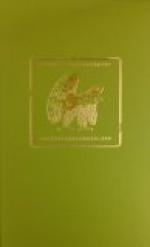“Oh, no, no,” she expostulated in evident distress. “I shouldn’t care to— set the pace—if I were to come into a kingdom; please don’t think that. I have wanted to keep up, I admit; to hold my own. I have been miserably afraid sometimes of being left behind, alone, crowded out, beaten.”
“Beaten? You? I guess not. Bet anybody ten to one you’ll be in at the finish, I don’t care who’s in the field, even if you drop in your traces next minute. And I bet if this sale does fall through to-night, you’ll be looking up, high as ever, to-morrow, setting your heart on something else out of reach.”
“Out of reach?” she responded evenly, arching her brows. “You surprise me. You have led me to believe I am easy to please.”
“So you are,” he capitulated instantly, “in most ways. All the same, you carry the ambitions of a duchess buttoned under that gray gown. But I like you for it; like you so well I’m going to catch myself taking that property off your hands, if Banks goes back on you.”
He leaned towards her as he said this, smiling and trying to hold her glance, but she turned her face and looked off obliviously across the room. There were moments when even Frederic Morganstein was conscious of the indefinable barrier beyond which lay intrenched, an untried and repelling force. He straightened and, following her gaze, saw Lucky Banks enter the door.
Involuntarily Elizabeth started, and Mrs. Feversham caught a quick breath. “At the eleventh hour,” she said then, and her eyes met her brother’s. “Yes or no?” they telegraphed.
It was the popular hour, an orchestra was playing, and the tables were well filled, but the mining man, marshalled by a tall and important head waitress, drew himself straight and with soldierly precision came down the room as far as the Morganstein group. There, recognizing Mrs. Weatherbee, he stopped and, with the maimed hand behind him, made his short, swift bow. “I guess likely you gave me up,” he said in his high key, “but I waited long’s I dared for the through train. She’s been snowed under three days in the Rockies. They had her due at Wenatchee by two-fifteen; then it was put off to five, and when the local came along, I thought I might as well take her.”
Mrs. Weatherbee, who had started to rise, settled back in her chair with a smile. “I had given you up, Mr. Banks,” she said not quite steadily.
Then Morganstein said: “How do, Banks,” and offered his hand. “Just in time to join us. Ordered saddle of Yakima lamb, first on the market, dressing of fine herbs, for the crowd. Suits you, doesn’t it?”
To which the little prospector responded: “My, yes, first class, but I don’t want to put you out.”
“You won’t,” Frederic chuckled; “couldn’t do it if you tried.”
But it was Elizabeth who rose to make room for the extra chair on her side of the table, and who inquired presently after his wife.




